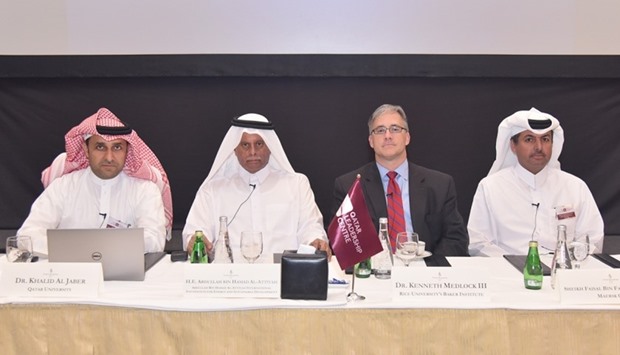He was delivering the closing address at ‘The energy and economic diversification policies’ roundtable organised by Qatar Leadership Centre (QLC) and Rice University’s Baker Institute in cooperation with the Ministry of Energy and Industry and Qatar University.
Al-Attiyah said, “We are preparing for the future with full knowledge of the inescapable reality – hydrocarbons are a depleting resource.
“Our obligation to coming generations is to leverage our ingenuity to find solutions for the most pressing challenges. The energy and economic diversification policies roundtable is a sterling example of experts, industry practitioners and leaders coming together in Qatar to collaborate for the common good.”
Dr Abdulla bin Ali al-Thani, QLC managing director and member, Board of Directors said, “This Roundtable facilitated a substantive dialogue among contemporaries that will aid us in a strategic and coherent approach of energy policy making. Our joint efforts are completely dedicated to furthering the region’s development to a sustainable future."
Ambassador Edward P Djerejian, director, Rice University’s Baker Institute, said, “Recently, I have seen GCC nations take many positive steps to transform their economies beyond hydrocarbons. This event was a valuable opportunity for experts to bring their knowledge of these issues to bear. The recommendations that will be delivered by Rice University’s Baker Institute and Qatar Leadership Centre as a result of our research and this roundtable will contribute to policy decisions and guide further discussions on the future of the region.”
In his remarks on behalf of QU President Dr Hassan al-Derham, QU chief strategy and development officer Dr Darwish al-Emadi said, “The Baker Institute has a long and distinguished record of engaging with our region through critical analyses of the pressing issues that challenge both policymakers and the public. I do not think it is an exaggeration to say that the issues listed on today’s agenda are matters of existential importance. “From economic diversification and subsidy reforms to the energy-food-water nexus and climate change, the sustainability of our way of life and indeed our very survival depend on the approach we take and the progress we make in managing our energy resources, and dealing with their social, economic, political, and environmental impacts. Indeed, the single most important lesson from the recent decline in oil prices may have been the need for new ways of thinking and innovative policymaking. Today’s agenda, for example, will be addressing subsidy reforms and other difficult, yet imperative, approaches to dealing with the consequences of declining oil prices in a region where more than 80% of revenue for some countries comes from oil.”
QU College of Law (Oil and Gas Law) assistant professor and IRL editor-in-chief Dr Talal Abdulla al-Emadi stressed the importance of energy for economic growth and the betterment of the standards of living
The two-day roundtable brought local, regional and global experts from the public and private sectors together to discuss policy related to vital topics such as energy, economy, water and food security, and the environment.
Qatar Leadership Centre and Rice University’s Baker Institute will produce a series of policy recommendations based on insights gained from the Roundtable’s sessions and the research papers presented.

